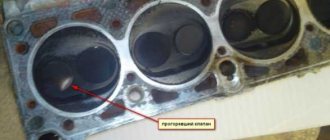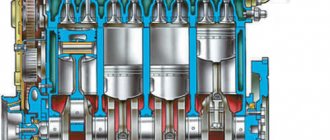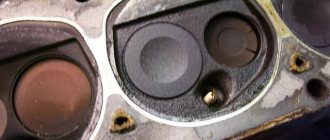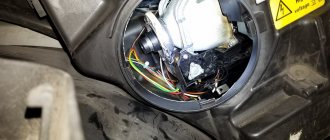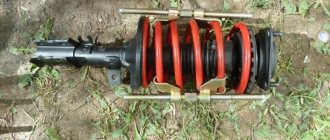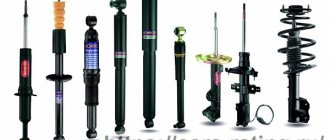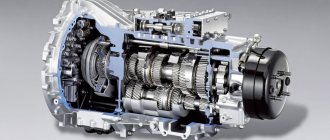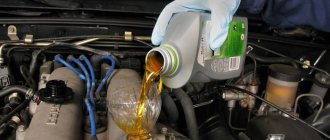Determining the source of the knock
It happens that a knock comes from the engine compartment. Only the driver may not immediately understand what exactly is the reason and who is the source of this noise. You should not immediately blame the valves, since they are not the only ones capable of making knocks.
It is quite difficult for a novice motorist, in the absence of experience in operating and repairing a car, to immediately determine what kind of breakdown or malfunction provoked the occurrence of noises and knocks. Sounds uncharacteristic of a working engine can come from bearings, belts, crankshafts, and the valves themselves. Moreover, in the latter case, we hear a fairly clear and easily audible sound, accompanied by a metallic knock. And it comes from the gas distribution mechanism.
Another characteristic feature of valve knock is that it does not stop, depending on the speed. That is, the knocking will persist when the engine is running at low speeds, and also when the driver, by pressing the gas pedal, increases the engine speed.
An ordinary driver is unlikely to be able to simply tell by ear that a valve has failed.
But still, self-diagnosis is quite possible. To do this you need to do the following:
- open the hood;
- unscrew the plug through which engine oil is poured;
- leave the engine running;
- listen; listen
- if the noise increases, the fault is in the valves;
- or take a stethoscope;
- apply the tool to the area where the noise is coming from;
- listen; listen
- draw appropriate conclusions.
This is just an approximate diagram of how to identify a breakdown and make a diagnosis practically in the field. Of course, it is often best to contact a car service center and undergo a comprehensive diagnosis. You can't joke with faulty valves.
As a consequence, you may encounter breakdown of the valves themselves, disruption of the timing belt, increased fuel and oil consumption, loss of power, and even failure of the engine itself.
The longer you ignore the problem, the more severe and expensive the consequences may end up being. If you hear a metallic knock while warming up or accelerating your car, go to a garage or service station. Don't delay diagnostics.
How to determine valve knock?
As you all know very well, nothing can work constantly. No matter how sad it may sound, there will come a time when you will need to take your vehicle to a service station to diagnose all kinds of faults. There are very complex breakdowns that cannot be repaired with your own hands. But there are also problems that you can fix in your garage yourself. For example, the knocking of valves is the middle. Sometimes you can fix the problem yourself, but sometimes you can’t fix it without the help of a specialist.
How can you determine if the valves are knocking?
For new motorists, at first it will be very difficult to understand why the noise occurs. Third-party sounds are formed in such cases if the following breaks down:
1. Belt
2. Bearing
3. Crankshaft
4. Valves
The valves produce a very clear, perceptible sound, as if tapping metal near the gas distribution mechanism (timing mechanism). One of the features is the consistency of the knock, both at low power and at high speeds. Of course, for a driver without skills, relying only on hearing, it is actually not possible to determine valve failure. You can do the diagnostics yourself:
1. You need to open the hood, then the hole with the plug for filling the oil. Leave your vehicle running and listen carefully. If it seems to you that the noise is increasing, then the valve is still faulty.
2. You can also install a stethoscope next to the part that you consider to be faulty. Using this method, you can determine the source of extraneous noise.
What is the cause of valve knocking
Modern vehicles are equipped with a camshaft. It is located on top. The valve is driven by a rod, otherwise called a “Pusher”. The valve makes a tapping sound for some reason. Let's look at each in turn:
1. Almost all motorists know that there is a certain distance between the rod and the valve, which is calculated by vehicle manufacturers. If there is a decrease or increase in space, a loud sound with metal tapping occurs.
2. With constant use of low-quality oil, engine detonation occurs.
3. If there is a knocking sound while driving at high speeds or during acceleration, this may indicate a lack of oil pressure to increase engine power.
4. The timing belt is not installed correctly or is stretched.
5. An important reason is wear and tear. Each part needs to be replaced after some time.
Valve knocking on a cold engine
When conducting diagnostics, pay close attention to the engine temperature. Some factors may be present regardless of whether the valves are knocking on a hot or cold engine.
Sounds that occur on a cold engine appear for the following reasons:
1. Engine wear.
2. Narrowing of the valves. At a high enough temperature level, all metals have the ability to expand. At minimum everything is different, they decrease. Therefore, the distance from the valve to the pusher decreased, and after the engine warmed up, it reached its original state.
It follows from this that the interval from the valve to the pusher does not correspond to the corresponding standard, and at a high level of engine temperature this may remain undetected.
Valve knocking on a hot engine
For what reasons, in this case, noise is created:
1. There is not enough oil in the barrel.
2. The hydraulic compensator is capable of producing sound.
3. Dirty oil filter.
4. If the camshaft bolt to the bed is not tightened properly.
What actions should be taken when valves knock?
To deal with this problem there is one simple way: you need to take your favorite iron horse to the nearest service station so that a specialist can correct the problem that has arisen. There are times when there is no financial opportunity to do this, or you simply want to repair the car yourself, gaining skills. If you look at it, this case with valves will seem to some like an extraordinary puzzle in terms of repair. Which is a very erroneous opinion. After all, making one wrong move will only increase the sound. For this reason alone, a driver without skills should not try to do this. If you decide to start repairs, be sure to read the repair instructions for your vehicle.
The following is a description of common instructions.
· To access the valve, you must first remove the “Cylinder Block Head” plug. Be sure to drain the oil;
· Then you need to turn the camshaft so that the mark on the pulley coincides with the installation protrusion;
· The distance from the valve to the rod can be determined by feeling it yourself;
· An adjustment washer can be used to adjust the gap;
· The specific configuration of the vehicle determines how many times the puck will be operated;
· After connecting all the parts back together, check again whether there is any sound after what has been done;
If the problem recurs, take the car to a service station, for the reason that you will not be able to fix other problems not related to space. It may very well be that the adjustment was not correct.
tickety-pdd.com
Main reasons
There are several reasons why valves in a car may start knocking. Even a novice motorist must know what affects the incorrect operation of these elements and how to prevent knocking from occurring.
The following reasons for the appearance of knocking can be identified:
- Reducing or increasing the clearances (space) between the valve and the pusher. The gap has a certain value provided by the manufacturer. If it changes, a knocking noise may occur;
- Systematic use of low-quality fuel. Extraneous sound occurs as a result of engine detonation;
- If a knocking noise occurs during acceleration or when driving at high speed, there is likely a lack of pressure in the oil system;
- Stretched timing belt;
- Incorrectly installed timing belt;
- Trivial wear and tear of parts.
But this is general information regarding the occurrence of knocking noises. Since we are talking specifically about a hot engine, we need to focus on slightly different reasons.
There are several factors that cause knocking to occur precisely when the engine is warmed up to operating temperature. It can appear when it is cold and persist when warming up, or it can occur directly when the internal combustion engine reaches a certain temperature.
The reasons are as follows:
- The camshaft bolt that secures it to the so-called bed was not fully tightened. This is a consequence of inattention during repairs, or the bolt simply became loose during the operation of the car;
- There is a shortage of oil in the crankcase. The lack of a sufficient amount of lubricant will certainly result in valves knocking on a hot internal combustion engine;
- The oil filter is dirty and does not fully fulfill its obligations.
In addition to the reasons listed, noise can be a consequence of malfunctioning hydraulic compensators. In some cases, simple adjustments can help get rid of noise. In other situations, complex and expensive repairs will be required.
Valves “knock”, reasons | Twokarburators.ru
Signs of a malfunction: the valves “knock” When the thermal gap between the end of the valve and the lever pressing on it increases, a malfunction appears - a characteristic metallic frequent fractional knock from the side of the valve cover.
The knocking sound is especially noticeable when the car engine is not warmed up, idling and at medium loads. There may be a “knock” of one valve, several valves, or all of them at once.
Causes of valve knocking
Why do the valves in the gas distribution mechanism of a car engine “knock”?
— First of all, the valves may knock due to wear
Over time, the ends of the valves, camshaft cams, and levers wear out. Therefore, it is recommended to periodically check thermal clearances (this period is individual for each engine). Wear occurs faster and “knock” will appear earlier when the engine is operated with low-quality engine oil and under difficult conditions.
— “Knock” of valves may be a consequence of incorrect adjustment of thermal clearances
— If the spring of one of the valves breaks or settles, it will also “knock”
— A bent valve will “knock”
— When unscrewing the locknut of the adjusting bolt there will be a “knock”
How to determine that it is the valves that are “knocking”?
In addition to the valves in the engine, valve guides, the camshaft in the housing supports, or the ignition timing is set too early, and we hear detonation in the combustion chambers, can also “knock” with a similar frequent fractional knock.
Many car owners can quite accurately determine valve malfunction by ear (the knocking noise under the valve cover in most cases is quite obvious and distinct). If you have doubts that it is the valves that are “knocking,” you can check with a stethoscope. We apply it to the valve cover of an idling, not warmed-up engine. The knocking of the valves will be heard clearly. You can even determine which valve knocks more.
How to eliminate “knock” in the valve mechanism of a car engine?
Only by adjustment.
checking thermal clearances in the valve mechanism of the K7j 1.4 liter Renault Logan engine
Plus the use of engine oil appropriate for this particular engine. For example, “Choosing motor oil for engines of VAZ 2108, 2109, 21099 cars.”
What happens if you continue to drive with knocking valves?
The filling of the cylinders with fuel is reduced, as well as the efficiency of removing gases from the combustion chambers. As a result, engine power and throttle response are reduced.
Notes and additions
— Depending on the design of the engine gas distribution mechanism, the thermal gap can be adjusted between the camshaft cam and the lever (2101, 2103, 2105, 2106), the valve end and the rocker arm (Moskvich 2140, Logan), by selecting adjusting washers between the camshaft cam and the valve pusher (2108, 21081, 21083).
More articles on the valve mechanism of a car engine
— Malfunctions of the gas distribution mechanism of the car engine
— Checking and adjusting thermal clearances on engines of VAZ 2101-2107, 2121 cars
— Checking thermal valve clearances on VAZ 2108, 2109, 21099 engines
— Checking and adjusting thermal valve clearances on the k7j 1.4 l engine of the Renault Logan car
twokarburators.ru
What to do in such a situation
It is important to understand that there is nothing good about valve knocks on a hot engine. The simplest solution would be to go to the nearest car service center, where specialists will check and fix everything.
But some people find it interesting and even useful to delve into the car themselves and gain new experience and knowledge. Someone will first have to read a lot of literature and technical documentation. Others will watch the video and easily repeat the manipulations done.
Although a similar problem occurs on many cars, it is the owners of inexpensive or quite old cars who prefer to take on knocking valves themselves, such as:
- Renault Logan;
- Chevrolet Niva;
- VAZ 2114;
- Lada Priora;
- VAZ 2106;
- Ford Focus;
- VAZ 2109;
- Opel Astra;
- Daewoo Nexia;
- Nissan Almera;
- Renault Sandero;
- Cherry Amulet, etc.
Explain why the valves in the engine knock?AutoRemka
Many drivers wonder why engine valves knock . In our article we will try to answer this burning question.
A knock in the engine compartment is the first sign of a malfunction in the engine . It is quite difficult to judge the severity of a malfunction based on a knock alone, but at the same time, you can at least estimate the volume of future repair work.
of reasons why valves , so to accurately diagnose the problem you need to conduct a detailed inspection of the unit.
Next, we will try to figure out why there is a knock in the valve mechanism, considering possible causes and options for eliminating this problem.
Often, valves begin to knock in cars with high mileage, or in cars of those car owners who have simply given up on caring for their “iron horse.” In addition, there are cases when valves begin to knock in a car that is still under warranty. But these are rare cases and knocking in the engine appeared, most likely, due to some kind of factory defect or omission of the assemblers.
Causes of knocking in valves
First reason. Increasing the maximum permissible gap between the camshaft levers and the cams. The gap between the above parts increases, then the cam begins to hit the rocker, which leads to the appearance of a sound effect that drivers talk about - knocking . The sounds of knocking valves in the engine resemble a metallic clatter. Many motorists try not to pay attention to this annoying clatter, because they think that such a knock is not critical, but they are very mistaken. You may ask why this problem cannot be left without a solution? The fact is that the gap with constant beating will only increase, and accordingly the beating parts will wear out faster. As a result, this will lead to the fact that the engine will simply stop starting and will require major repairs. The amount of permissible clearance in the valve mechanism is clearly regulated by the manufacturer of your engine. At the slightest deviation from the established standards, it is necessary to adjust the valves.
The second reason. The valve mechanism elements are knocking due to too little clearance. Valves operating with small clearances cease to close completely after some time, and this leads to general overheating of the engine, a drop in compression and severe excessive fuel consumption. In order to prevent such a problem from occurring, we recommend adjusting the valves every 10–15 thousand kilometers, regardless of whether you have knocking noises or not.
Third reason. Knock due to engine detonation. Detonation is a kind of explosion in the combustion chamber, which forms a strong blast wave that shakes all engine parts, including elements of the valve mechanism. As a result, it turns out that due to detonation, parts of the cylinder-piston group, valve mechanism, etc. knock Signs of detonation include a drop in engine power, strong vibration and black smoke from the exhaust pipe.
Fourth reason. Valve knocking in a hot engine. The reason is low oil pressure. This problem is caused by excessive wear of the lubrication system parts.
Fifth reason. Valve knocking may occur due to the fact that your motor oil does not meet the standard in its physical condition and viscosity characteristics. In this case, you need to change the engine oil.
The sixth (last) reason, which answers the question why there is knocking in the valves “when cold”. The problem is critical wear of the pushers, due to which insufficient engine oil reaches the valves. A lack of lubrication results in a characteristic metallic knock.
autoremka.ru
What's wrong with them
Now we will describe common reasons explaining why valves knock. In modern engines, the camshaft is located on top, its cams push the valves through rods - a simple, best mechanism. The rods are called pushers.
- There is always a minimum gap between the tip of the pusher and the cam, regulated by the manufacturer. An increase in the gap is one of the reasons why the valves began to knock. As the gap decreases, knocking will also appear, and the valve may eventually stop closing tightly.
- Another possible cause of monotonous valve song could be a knocking engine, for example, due to bad gasoline.
- If valves knock only during acceleration, this is most likely due to increased engine speed and insufficient oil pressure.
- The malfunction may occur due to a poorly tensioned timing belt.
- Finally, it is simply wear of parts or shaft cams.
With all this, it is necessary to distinguish between two main types of the problem being analyzed. Valve knocking sometimes occurs only on a cold engine or, on the contrary, only on a warm one. Let's look at these varieties separately. If the valves knock only when cold, then the essence of the phenomenon is as follows:
- the engine is a bit old, worn parts show themselves with large gaps when starting up, gradually, when warming up, the iron expands, the gaps decrease, the sound disappears, this is the main answer to the question why valves knock only on a cold engine;
- The gap between the pusher and the cam is no longer normal, but on a warm engine it still does not produce an extraneous sound.
If the problems with the valves are only hot, then the possible prerequisites are as follows:
- the bolt securing the camshaft to the bed is not tightened well; when warming up, the cam seems to move away from the pusher;
- insufficient oil level in the engine, severely clogged oil filter - because of the latter, for example, there is no longer enough oil for the valves when it’s hot;
- hydraulic compensators are knocking.
About hydraulic compensators and more
Let's talk about them separately now. If they are not there, for example, when a VAZ 2109 (which does not have them) has a valve knocking somewhere, then the last reason from the above list immediately disappears... So, if they are not there, the valve clearances are adjusted using special washers, and if they are there are... They perform a self-regulatory function. In general, a hydraulic compensator includes a housing and a plunger. Both are located just between the cam and the valve. When the cam moves, oil from the engine enters the housing, pushing out the plunger. It fills the entire thermal gap between the cam and the end of the valve stem when the valve opens, and when it closes, the oil leaves. This solves the problem.
Valve knocking on a cold engine
The absence of increased noise and extraneous sounds during the operation of any engine indicates the good condition and normal operation of all components and mechanisms of the power unit. The appearance of a knocking sound in the engine always indicates certain failures, breakdowns or other malfunctions of the internal combustion engine.
One of the most common problems that car enthusiasts often encounter is valve knocking. Next, we will look at why valves knock on a cold engine, talk about valve knocking on a hot engine, and also answer the question of how to determine the cause of such engine knocking.
Read in this article
Valve knocking: main reasons
At the very beginning, we note that valve knocking is a problem that is more typical of engines without hydraulic compensators. In other words, these elements can knock on engines that structurally require the need to adjust the valves at a certain frequency. As for engines that are equipped with hydraulic compensators, in units of this type it is often not the valves themselves that knock, but the compensators mentioned above.
We also recommend reading the article about what a hydraulic compensator is. From this article you will learn about the design of this element, as well as how hydraulic compensators work to automatically adjust the valve clearance.
Valve knocking usually appears on engines in two cases:
- natural wear and tear of the power unit as a result of impressive mileage;
- the valves are not adjusted or this procedure was performed incorrectly;
In other words, the mechanism can knock both on an old engine and on a relatively new engine that has only traveled a few tens of thousands of km. The main reason for this knocking is a strong increase in the gap that is present between the camshaft cam and the lever. An increased gap between these elements means that the camshaft cam hits the rocker. The result is a general increase in noise during operation of the engine and timing belt; the engine runs “hard”. The appearance of a distinct ringing metallic sound was also noted, which is clearly audible and localized in the area of the cylinder head and valve cover.
It should be understood that the valve thermal clearances initially set at the factory tend to get lost after several tens of thousands of kilometers traveled. It is for this reason that the owner needs to adjust these gaps from time to time. The setting is carried out taking into account a strictly defined value for a specific type and model of engine, which is prescribed in the operating instructions for a particular vehicle.
Let us immediately note that the generally accepted recommendation for valve adjustment intervals is a mileage of 15-20 thousand km. Before making adjustments, especially on older engines, it is necessary to eliminate the possibility of problems with oil pressure in the lubrication system. The gap adjustment itself is carried out using feeler gauges. These probes are inserted into the slot, which is located between the pusher and the cam on engines with an overhead camshaft. On other types of motors, the gap is located between the upper edge of the rod and the rocker arm. When setting the gaps, it is also advisable to take into account the outside air temperature. The valves are optimally adjusted at a temperature of +20 degrees Celsius. If adjustments occur, for example, at negative temperatures, then this nuance should be taken into account and a certain correction should be made for it.
Reducing the gap (the valves are clamped) is also unacceptable. The fact is that in the case of clamped valves, the following happens: after a relatively short run, they stop closing completely. If these elements cannot close completely, then the compression in the cylinders drops due to depressurization of the combustion chamber, hot gases break through the gap between the valve and the chamfer, engine overheating, valve burnout, etc. occurs. In this case, the engine starts poorly, loses power, consumes too much fuel, suffers from trouble, etc. The result is the impossibility of further normal operation of the internal combustion engine and the need to eliminate both the problem itself and the likely consequences of driving with clamped valves. Please note that the degree of increase or decrease in the gap directly affects the wear of not only the timing belt, but also the entire engine. Long-term operation of the power unit with obvious knocking in the gas distribution mechanism leads to serious damage and rapid failure of the entire power unit.
We also recommend reading the article on how to determine valve burnout yourself. From this article you will learn by what signs and in what ways you can find out that the timing valve has burned out.
Valves knock “cold” and/or “hot”
As mentioned above, the causes of valve knocking, first of all, include violation of thermal clearances. This gap may be too large or too small. A common situation is when valves knock on a cold engine, but as the engine warms up, the extra sounds disappear. Auto mechanics with extensive experience explain this phenomenon simply.
In a car engine with high mileage, the parts are already worn out, resulting in increased gaps between them. At the same time, the gaps remain within normal limits, that is, such an increase does not affect the proper operation of the systems and the engine itself. The only nuance can be considered an increase in valve noise on a cold engine. After the engine heats up, the metal expands, conditionally “selecting” excess gaps, and the engine begins to operate normally.
Another common situation is that the valve mechanism on a new or recently repaired engine is knocking. In such a situation, you need to check the quality of the adjustments. As already mentioned, the valves may become stuck and require readjustment. Another reason for knocking when cold is wear of the pusher. The formation of dirt and deposits in the pusher area, engine oil leakage and other deviations cause a decrease in the efficiency of lubricant supply. As a result, after starting a cold engine and until a certain warm-up, a ringing metallic sound is clearly heard. In this case, the valves “clatter” a lot.
Note that it can be difficult for a driver without sufficient experience to determine by ear the exact cause of a knocking sound in the engine. In the case of a gas distribution mechanism, it must be taken into account that the camshaft rotates twice as slow as the crankshaft. This means that the knocking frequency will differ from the general noise of the operating unit.
For a more accurate determination, you can use a simple and accessible method. It is necessary to prepare an empty metal can or mug, which is applied to the surface of the hood and a knock is heard through it. The sound is heard more clearly, which allows you to more accurately determine the malfunction. Let us add that some car enthusiasts confuse the knocking of valves on a cold engine with the knocking of the timing chain. In this case, you need to carefully diagnose the malfunction, that is, check the condition and degree of tension of the chain.
Let's move on to diagnosing and finding out the causes of valve knocking, which cannot be eliminated by standard adjustments.
- In some cases, when adjusting the valves does not help, it is necessary to remove the camshaft and check it for play. At the same time, the rockers should be inspected for severe wear at the ends of the valves. If such a development is detected, then it can be removed, after which it is necessary to check the marks and installation of the valves. During the inspection, equal attention is paid to both the intake and exhaust valves.
- The knocking of valves “when hot” after the engine reaches operating temperatures, in addition to the broken clearance, can occur at idle or when the engine speed increases. This often occurs due to a decrease in oil pressure in the lubrication system. In this case, you should check the suitability and condition of the lubricant in the engine (viscosity, degree of contamination, etc.), after which you will need to additionally measure the engine oil pressure. Also, we should not forget about the natural wear of parts or the occurrence of breakdowns, which naturally causes an increase in noise after the internal combustion engine warms up.
- When determining the causes of timing knock, you must always remember the phenomenon of engine detonation. If the process of fuel combustion in the cylinders becomes explosive, then the shock wave hits the cylinder walls and other elements of the CPG strongly. Such impacts can cause valve knocking, although the valve mechanism itself is serviceable and normally adjusted.
Let's sum it up
The appearance of valve knocking indicates the need to quickly solve this problem. In addition to increasing the gap, the causes of increased noise may be:
- worn camshaft cams;
- broken valve spring;
- there is a defect in the valve guide;
- the timing belt/chain has become loose;
- there is a decrease in the efficiency of lubricant supply through the camshaft channels to the valve stems;
- there were problems with fixing the camshaft;
For high-quality repairs, you will need to disassemble the engine (remove the valve cover or cylinder head), after which the camshaft and other timing elements are repaired. Let us add that timely professional adjustment of valves can significantly increase the life of the gas distribution mechanism and the internal combustion engine itself.
Valve knocking in the engine - reasons why valves knock and what consequences to expect
Home » Engines » Valve knocking in the engine - reasons why valves knock and what consequences to expect
035
Cause of valve knocking
Not a single mechanism, including internal combustion engines, can operate without timely maintenance. It is important to carry out preliminary diagnostics and routine repair work, regardless of whether the power unit is working properly or not. All sorts of foreign noises from under the hood are sure signs of malfunctions, which, if not promptly intervened, can result in very significant costs for the car owner.
Perhaps the knocking of valves cannot be confused with another sound source. In terms of noise level, only a motor that troits can compete with the clatter of valves. The problem under consideration is typical for engines that have traveled more than one hundred thousand kilometers, were untimely and poorly serviced, or were subjected to loads that exceed the rated load. In the latter case, valve knocking can occur even on a new car that is still under warranty.
As for the cause of the knocking, it is quite obvious and is characterized by an increase in the gap between the camshaft cams and the levers. A metallic clatter appears when the gap set by the manufacturer exceeds the permissible limits. Such a malfunction cannot be ignored, since the unpleasant sound itself is just “flowers”.
Why do engine valves knock?
- When an engine operates for a long time with a faulty gas distribution system, this cannot but affect its performance characteristics and service life. In particular, there is increased wear of all working components, due to which the engine may even fail. The car owner must understand that for each car model the valve clearances are individual, so adjusting them “at random” will not bring the desired result.
- If the clearances are adjusted incorrectly and their value is less than the normalized value, the valves will be constantly clamped during operation. Operating valves under these conditions may cause them to stop closing completely over time. The consequence of interruptions in the operation of the gas distribution system is frequent overheating of the engine and a decrease in compression in the cylinders.
- If valve knocking begins to be heard when the engine is warm, most likely the oil pressure in the system does not meet the required standard. In any case, to avoid problems, the valves should be adjusted every 15-20 thousand kilometers.
- Also, the knocking of valves or one valve when the engine is cold when warming up can be heard with faulty hydraulic compensators; when the engine warms up, the noise from the valves usually goes away, in this case you can still wait for repairs, this is not critical, in this mode the engine can still run for a very long time time and 10 and 20 thousand kilometers
The need to replace hydraulic compensators on the cylinder head occurs when knocking from the valves occurs both on a cold and on a warm engine. In this case, it is recommended to completely overhaul the cylinder head.
Why is there a knocking noise?
The main reason is the increased clearance between the lever and the camshaft cam. In such a situation, the cam will knock on the rocker. At idle speed, a characteristic metallic clatter will be heard. The larger this gap, the stronger the sound and the more significantly the timing elements wear out.
Insufficient clearance also harms the engine. In this case, the valves are “squeezed” and may not close completely. Over time, such an engine may overheat, reducing compression and power. Another reason for knocking engine valves is detonation. This is a kind of micro-explosion, in which a wave of fire hits the cylinder walls. As a result, valve knocking may occur. Among the signs of detonation, it is also worth noting a decrease in the power of the internal combustion engine, overheating, black smoke from the exhaust pipe, and increased vibrations of the power unit.
